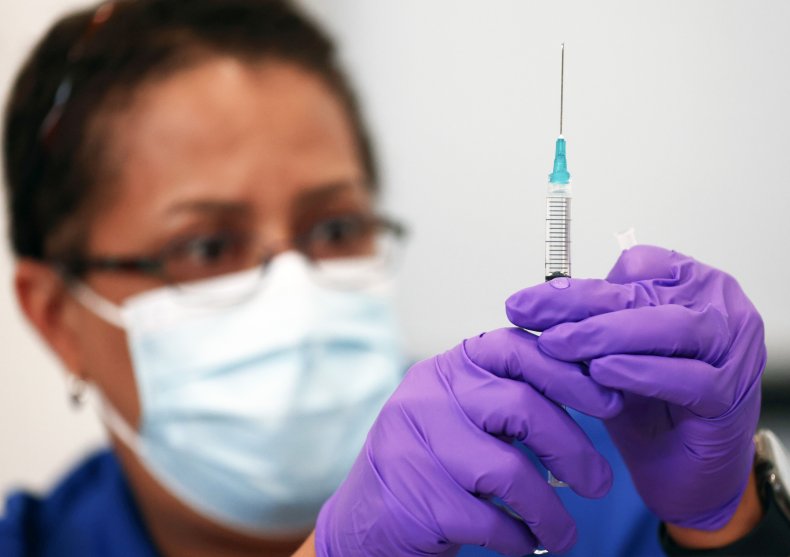Pfizer's COVID-19 vaccine received full approval from the Food and Drug Administration (FDA) on Monday, the first COVID-19 vaccine to move out of its Emergency Use Authorization stage.
The FDA issued Emergency Use Authorizations (EUA) for the Pfizer COVID-19 vaccine in December, followed by Moderna a week later and Johnson & Johnson in February. An EUA allows the vaccines to be used despite not having approval because of the public health crisis, but on Monday, the FDA granted Pfizer full approval, meaning it can now market its product for use in people who are 16 or older. It will also now be referred to as Comirnaty in its marketing.
"The FDA's approval of this vaccine is a milestone as we continue to battle the COVID-19 pandemic," acting FDA Commissioner Janet Woodcock said in a statement. "The public can be very confident that this vaccine meets the high standards for safety, effectiveness, and manufacturing quality the FDA requires of an approved product."
To receive an EUA, the FDA evaluates whether the known and potential benefits outweigh the potential risks of the vaccine. It can only be issued after a final analysis or interim analysis of a Phase 3 clinical efficacy trial, which is the largest trial of a vaccine's development. In making its decision whether to issue the EUA, the FDA evaluates the safety and efficacy of the product, as well as, the manufacturing and control information for the vaccine.
The speed at which COVID-19 vaccines were developed led some to question their safety. But, public health officials, including Dr. Anthony Fauci, director of the National Institute of Allergy and Infectious Diseases, denied any corners were cut in the production and approval processes.

Part of the reason vaccines were able to be developed so quickly, according to Fauci, is advancements in technology. Companies also had financial motivations for being among the first to develop a vaccine and former President Donald Trump championed his administration's monetary investment in vaccines.
Before vaccines were proven safe and effective, the Trump administration had agreements with several companies for billions of dollars worth of COVID-19 vaccine doses. This meant companies were manufacturing the vaccine before receiving the EUA, preventing lags in production that could stall it getting out to the public.
In June, Pfizer submitted an application to the FDA seeking permission to distribute and market its COVID-19 vaccine in the United States. The application built on information Pfizer gave to the FDA before receiving its EUA, including clinical data and information and details about the manufacturing process.
The information spanned hundreds of thousands of pages, according to Peter Marks, director of the FDA's center for Biologics Evaluation and Research, and also included data about follow-ups in a larger clinical trial population after more time had passed since they were inoculated. About 12,000 people were followed for at least six months.
Although the vaccine received approval quickly, Marks said it was only granted in line with the FDA's existing "high standards for vaccines."
"While millions of people have already safely received COVID-19 vaccines, we recognize that for some, the FDA approval of a vaccine may now instill additional confidence to get vaccinated. Today's milestone puts us one step closer to altering the course of this pandemic in the U.S.," Woodstock said.
The hope is that the approval will move some previously hesitant people to get vaccinated against COVID-19 by reducing the number of people who consider it to be "experimental." It's possible the authorization could boost inoculations because of an increase in mandates, as well, as Surgeon General Vivek Murthy thinks it will give companies confidence they can legally implement the mandate.
Pfizer's approval is only for people over 16 years of age and the use of the vaccine in children as young as 12 is still under an EUA. Moderna and Johnson & Johnson are also still operating under an EUA, but Moderna could be receiving approval from the FDA in the next few weeks, as it submitted its application about a month after Pfizer. Johnson & Johnson, which was the third vaccine to receive an EUA, expects to submit its application by the end of the year.
"use" - Google News
August 23, 2021 at 10:05PM
https://ift.tt/3koy2NQ
Is the COVID Vaccine FDA Approved? How Approval Differs From Emergency Use Authorization - Newsweek
"use" - Google News
https://ift.tt/2P05tHQ
https://ift.tt/2YCP29R
Bagikan Berita Ini














0 Response to "Is the COVID Vaccine FDA Approved? How Approval Differs From Emergency Use Authorization - Newsweek"
Post a Comment